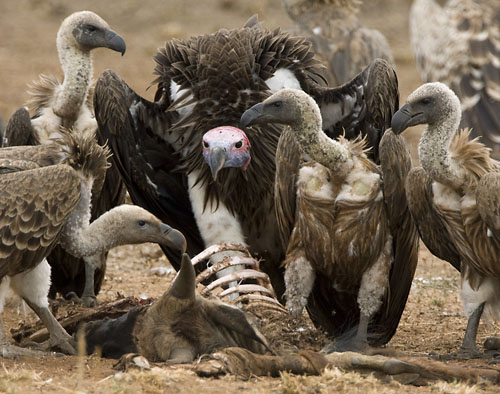Director General, Nigerian Conservation Foundation (NCF), Adeniyi Karunwi, is bothered by the rate at which vultures are declining. In this treatise, he emphasises that people need to be aware of the good services vultures provide to them, and as such participate in tackling the troubles faced by the endangered birds

The decline of vultures in Nigeria should be everyone’s concern if we understand and appreciate their importance or contributions to human health and the economy. The decline in the number of vultures is due to many factors.
The Nigerian Conservation Foundation (NCF) advocacy campaign started this year during the 2017 Chief S. L. Edu Memorial Lecture with the theme “Decline of Vultures: Consequences to Human Health and the Economy”.
Attention is being devoted to vultures because of the alarming rate of their decline. Threats to vulture species are from humans. Vultures today are in dire situation especially outside conservation areas. They are in danger of being poisoned, especially through the deliberate poisoning of carnivores; electrocution by powerlines passing through breeding sites, direct persecution and declining food availability. Deliberate poisoning of carnivores is likely the most widespread cause of vulture poisoning. Human persecution of vultures has occurred for centuries and continues unabated. These are all human-induced threats!
Vultures play a crucial role to human health and the economy. They keep our environment free of carcasses and waste thereby restricting the spread of diseases such as anthrax and botulism etc. They are of cultural value to the Nigerian communities. They have important eco-tourism (bird watching) value. Vultures are nature’s most successful scavengers, and they provide an array of ecological, economic, and cultural services. As the only known obligate scavengers, vultures are uniquely adapted to a scavenging lifestyle. Vultures’ unique adaptations include soaring flight, keen eyesight, high sense of smell and an immune system adapted to degrading carcasses with no negative effect.
Vulture decline would allow other scavengers not properly equipped for scavenging to flourish. Proliferation of such scavengers could bring bacteria and viruses from carcasses into human cities. We need to rise and prevent this from manifesting.
Ecological consequences of vulture decline include changes in community composition of scavengers at carcasses and an increased potential for disease transmission between mammalian scavengers at carcasses and human population. There have been cultural and economic costs of vulture decline as well, particularly in Nigeria.
Vultures in Nigeria are ignorantly considered an omen of evil; therefore, the evil must be stopped. This leads many to kill vultures in the quest for averting supposedly eminent evil. Sad to know this barbaric act still exists.
A recent survey conducted this year by the Nigerian Conservation Foundation (NCF) at wildlife markets in Ondo, Osun and Ogun States in South West Nigeria revealed that Kano, Ibadan and Ikare are the hubs of vulture sales. Wildlife and herbs sellers visit these trade hubs to get vultures (live or dead) for their customers and users. Vultures, it was gathered, are being used by the belief-based practitioners and other spiritualists for “Awure” – fortune charm. The survey revealed that a vulture head goes for between N12,000 and N15,000 at retail markets, a feather costs N100, while other parts cost between N500 and N2,000. The findings further show that although a whole vulture could cost as high as N20,000 to N30,000, once the head is off, the rest of the parts may not attract much money.
Belief-based use is a major driver of vulture decline in Nigeria especially in the South West where they were assessed to be major ingredients in traditional concoction. The local markets for vulture species have soared up in multi-folds as a result of continued demand within the belief-based system. Belief-based professionals who are the users of this economically important species are currently decrying the high price of this commodity as it affects their business. However, there is a need for a change in the traditional belief system that have entrenched the cultural cocoon of the day-to-day existence of people.
The economy of a nation or of a people is not built by trading in commodity and other allied items only, but also on a healthy environment. When an environment is made healthy by ensuring that all the components are functioning properly, people are healthy and trade successfully, which has a ripple effect of imparting directly on the nation’s economy. A healthy soul is a wealthy soul and a healthy people are a healthy nation.
People need to be aware of the good services vultures provide to them and participate in tackling the troubles faced by vultures. Researchers need to establish a simple monitoring network for vultures. Toxic drugs that are harmful to vultures need to be eliminated. Time to save the vultures from vanishing is now! Time to be more aware of the happenings in our environment is now! And time to take bold steps to further save nature is now!
